Animals
-
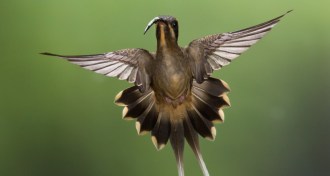 Life
LifeHummingbirds take stab at rivals with dagger-tipped bills
Sharp points on the bills of male long-billed hermit hummingbirds may have evolved as weaponry.
By Susan Milius -
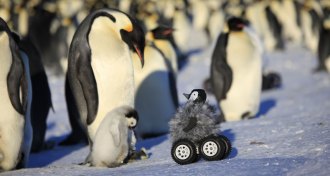 Animals
AnimalsRemote-controlled rover doesn’t spook penguins
Remote-controlled rovers get close to skittish penguins without bothering them; a chick disguise wins over the wariest birds.
-
 Climate
ClimateMelting ice forces walrus detour
Warming temperatures and shrinking summer ice cover have forced the animals to seek solid ground during feeding season.
-
 Paleontology
PaleontologySome trilobites sported dual digestive tracts
CT scans reveal trilobites with two-lane digestive tracts.
-
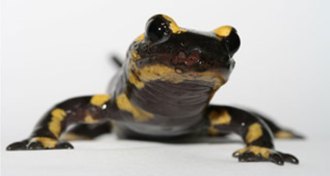 Life
LifeClose look at new fungus reveals origins, spread of salamander killer
A second chytrid fungus described last year targets salamanders and may be spreading in the animal export trade.
By Susan Milius -
 Animals
AnimalsTen real-life Halloween horrors in the natural world
Vampires and witches are nothing compared to mind-controlling parasites, nose ticks and antibiotic-resistant superbugs.
-
 Earth
EarthEarly animals couldn’t catch a breath
Low levels of oxygen may have hindered evolution of animal life hundreds of millions of years ago.
-
 Animals
AnimalsBirds large and small hop over obstacles in similar ways
Bipedal birds, from tiny quail to huge ostriches, tackled a step in a similar way, minimizing energy cost and maximizing safety.
-
 Animals
AnimalsNew frog species discovered in New York City
A new frog species lives up and down the East Coast. It was discovered when ecologists realized its ‘ribbit’ was distinct from the calls of a lookalike species.
-
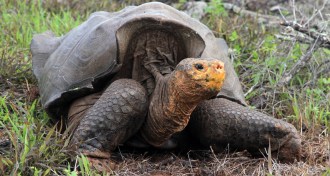 Life
LifeA little good news for giant tortoises in the Galapagos
The giant tortoise population on the Galapagos island of Española is on the rebound, but there are still concerns about other markers of conserving the endangered species.
-
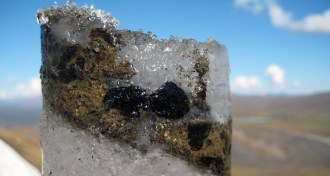 Microbes
MicrobesFrozen caribou feces offers look at virus evolution
Genetic material extracted from caribou poop gives hints about how viruses evolve.
-
 Paleontology
PaleontologyAncient jellyfish suffered strange, sandy death
A fossil hints at the unusual series of events that led to an ancient jellyfish’s preservation and may offer clues to understanding odd sand deposits found elsewhere.